How May-Treanor and Walsh Jennings “danced” to victory
Misty May-Treanor believes that an atmosphere in which both she and Kerri Walsh Jennings felt free to “make mistakes” was the key to one of the most successful partnerships of the modern Olympic age. Here, the US beach volleyball star lifts the lid on life as a triple gold medal-winning duo.
The numbers behind Misty May-Treanor and Kerri Walsh Jennings’ beach volleyball partnership are almost daft. The duo claimed three straight Olympic gold medals between 2004 and 2012, winning 21 consecutive matches.
Perhaps most remarkably of all, the US pair lost just one set during that extraordinarily golden period. The list goes on and on, with May-Treanor and Walsh Jennings taking home three successive FIVB world championship titles (2003-2007), pocketing five AVP Team of the Year crowns (2003-2007) and once going a gobsmacking 112 matches and 19 tournaments without defeat.
Even May-Treanor herself was unable to keep count.
“Right until now, I don’t know the amount of wins we had or anything,” the first lady of beach volleyball laughed. “We never really talked about it and we were never like, ‘Hey, if we win this it will be number XX’.” While this relaxed, slightly dismissive attitude is entirely understandable – May-Treanor would have needed an army of statisticians to keep on top of her record-breaking exploits – if you push a little deeper, in search of the reasons behind the genius, the star comes alight.
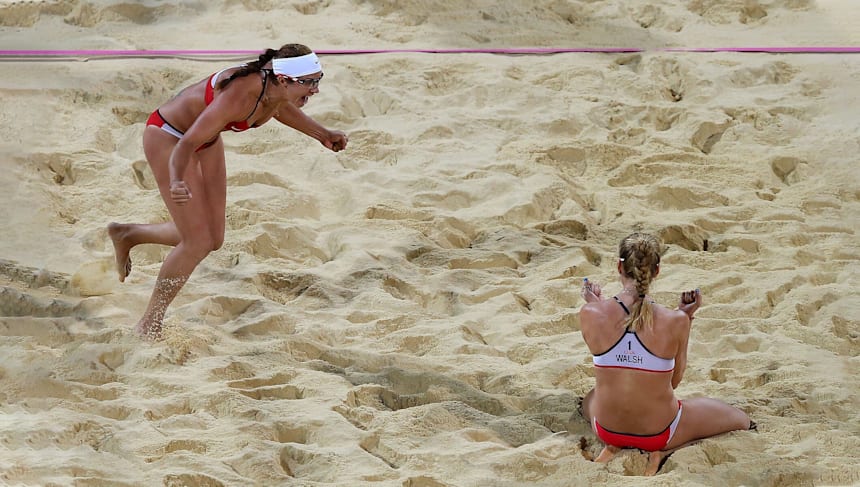
“If there was a bad dig, I knew Kerri would go and make the best play she could for it,” May-Treanor explained. “Because we wanted our partner to succeed, it gave that partner freedom to make mistakes. We knew the other person was there to help.
“If you play together for years and years, you kind of feel it. Volleyball is really a dance – you see those professional dancers, they know what the next move is without verbalising and that is how Kerri and I were. We had played together for so long, you get used to seeing movement and you think the same. If you go in with a game plan and you think alike, that is when the dance happens.”
It is a beguiling image of a partnership that was given time to develop – something many are not. Both May-Treanor and Walsh Jennings were high-quality indoor volleyball players, coming to the sand after shining brightly under the lights. The former switched courts in 1999, with Walsh Jennings following her a year later, after finishing fourth with the US indoor team at the Olympic Games Sydney 2000.
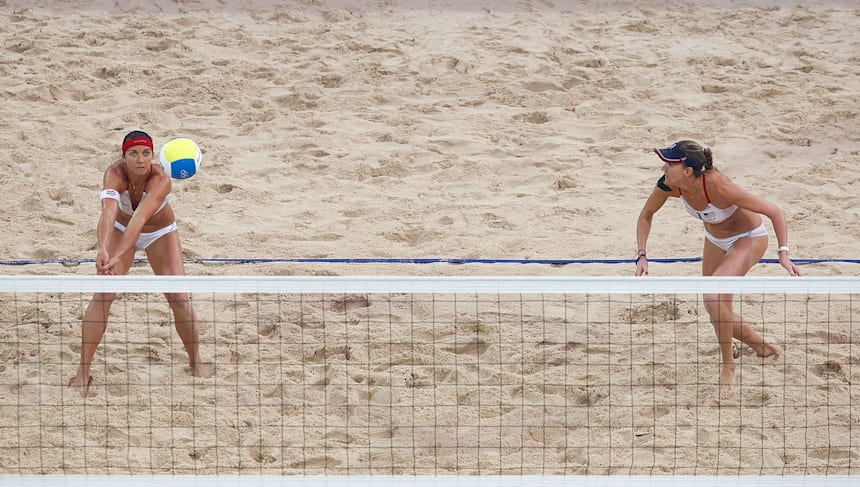
Patience had to be the watchword at first, despite the duo’s obvious drive and ambition. “It didn’t happen for us in the first year, maybe not the second either,” May-Treanor said. “Some partnerships will not wait. You find teams that maybe don’t win three tournaments and they are like, ‘Oh, we have got to make a change’, but the only way to get better is to work through it. “I knew it would be successful but she [Kerri] was a little more nervous. I knew if we gave it time we had something special. Our first year, we only won one tournament.”
The pair, who were 22 (Walsh Jennings) and 23 (May-Treanor) years old when they first teamed up, were busy doing something far more valuable than just winning; they were growing up together. This period, the calm before the avalanche of titles, was “so much fun” according to May-Treanor, and vital for ensuring the blocks were in place, upon which an era-defining dynasty could be built. By the time the Athens 2004 Games came around, May-Treanor and Walsh Jennings were not only already the pair to beat in the women’s competition, but they had also established a belief in each other which would only grow and grow.
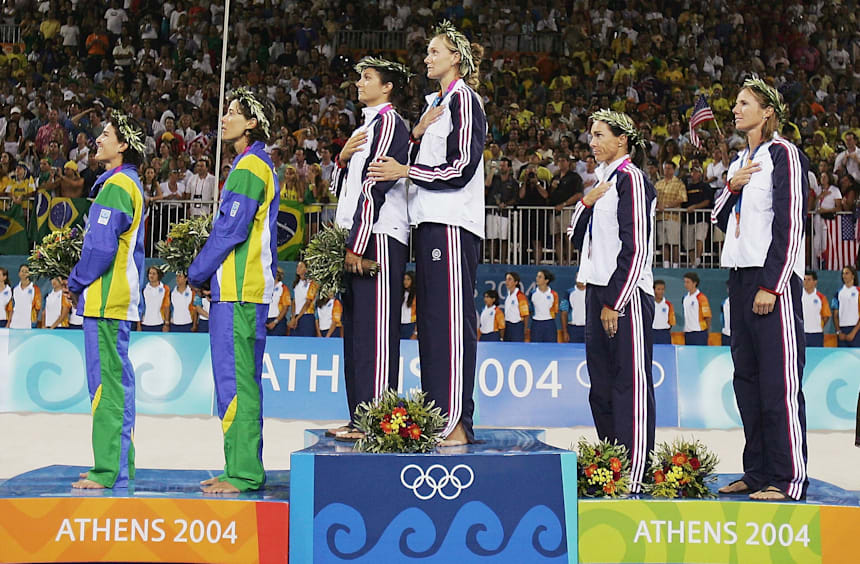
“I trusted that when Kerri stepped off the court she would get her work done, so that when we reconvened the next morning she would be in the best shape she could be in,” May-Treanor said, adding: “You have to have that trust that your partner is going to be there, next to you, when you are competing.”
The all-court pair – May-Treanor had played as the blocker with partner Holly McPeak at Sydney 2000 before moving to the back of the court to allow the 1.88m Walsh Jennings to dominate the net – were utterly irresistible as the Games returned to their spiritual home, winning all seven matches without dropping a set.
It is too simplistic to say that the twosome were the perfect match on and off the court. The reality is more impressive than that. May-Treanor and Walsh Jennings had to make sure the partnership thrived at every level.
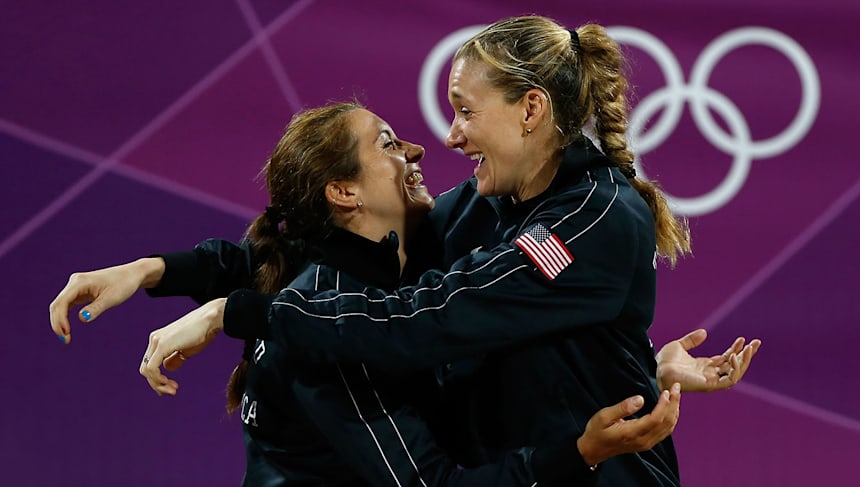
“A lot of people had trouble cracking us because we had different energies – Kerri is ‘ra-ra’, the more boisterous, loud leader, and I am more of the silent, get-the-work-done, lead-by-example kind of leader. So, we balanced each other out,” said May-Treanor, who is currently serving as Director of Volleyball Operations at Long Beach City College.
“And we never wanted to give up. We always played for each other.”
Not that it was all sunshine and light en route to adding gold at Beijing 2008 and London 2012 to that breakthrough success in Athens. Humans that they are, May-Treanor and Walsh Jennings fell out along the way but, unlike many, they chose to learn from each speed bump.
10 years ago #OnThisDay, the women's beach volleyball tournament at the #Beijing2008 Games ended with a dramatic match played in the pouring rain.
— Team USA (@TeamUSA) August 21, 2018
Powerhouse duo @MistyMayTreanor and @kerrileewalsh repeated as Olympic CHAMPIONS. 🥇🙌 pic.twitter.com/L8ZAKWmLiI
“We had our arguments, not very often but we had them,” mother-of-three May-Treanor said with a smile. “We would vocalise our displeasures and then get on with it. You have to respect each other’s differences and learn communication.”
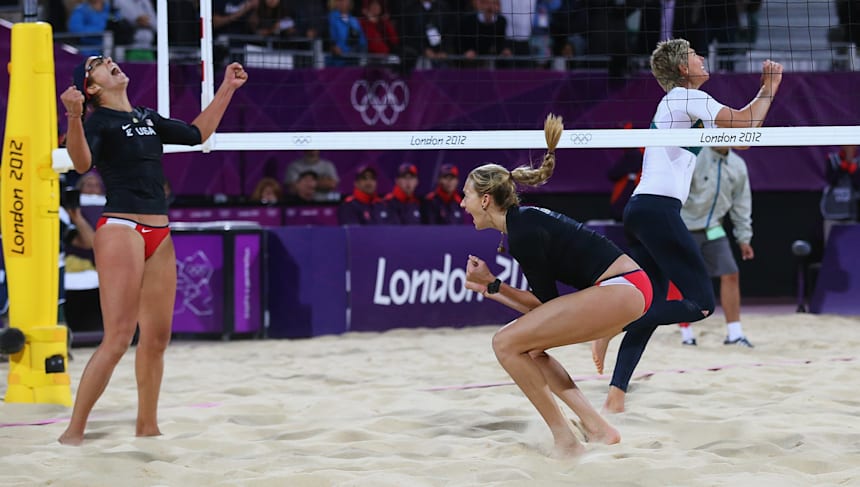
The end finally came at London 2012. The double defending champions recovered from the shock of losing their first-ever Olympic set to the Austrians in a group game and battled past the highly rated Chinese pair of Xue Chen and Zhang Xi in the semi-finals. Compatriots April Ross and Jennifer Kessy put up a valiant fight in the final but no one was going to deny May-Treanor from going out with a third gold hung around her neck.
While the now 41-year-old is busy passing on her knowledge to the next generation, Walsh Jennings is still out on tour, aiming to qualify for her sixth Olympic Games in Tokyo next year.
When asked whether she misses her partner, May-Treanor’s reply is wonderfully indicative of the reasons why, together, the duo became the best there has ever been.
“I really miss training with Kerri,” May-Treanor said. “That is when you push yourself the most, in the weight room and on the sand in practice.”